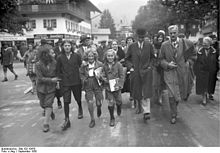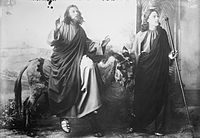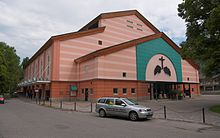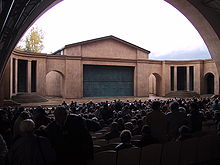- Oberammergau Passion Play
-
 Henry Ford attending the Passion Play in 1930
Henry Ford attending the Passion Play in 1930
Oberammergau Passion Play is a passion play performed since 1634[1] as a tradition by the inhabitants of the village of Oberammergau, Bavaria, Germany.
Contents
Origins
The town's residents vowed that if God spared them from the effects of the bubonic plague ravaging the region, they would produce a play every ten years thereafter for all time depicting the life and death of Jesus. The death rate among adults rose from one in October 1632 to twenty in the month of March 1633. The adult death rate slowly subsided to one in the month of July 1633. The villagers believed they were spared after they kept their part of the vow when the play was first performed in 1634. Performances took place in 2000, and the most recent season of 102 performances took place from Saturday 15 May until Sunday 3 October 2010.
The play, now performed repeatedly over the course of five months during the first year of each decade, involves over 2,000 performers, musicians, and stage technicians, all residents of the village. The play comprises spoken dramatic text, musical and choral accompaniment and tableaux vivants, which are scenes from the Old Testament depicted for the audience by motionless actors accompanied by verbal description. These scenes are the basis for the typology, the interrelationship between the Old and New Testaments, of the play. They include a scene of King Ahasuerus rejecting Vashti in favor of Esther, the brothers selling Joseph into slavery in Egypt, and Moses raising up the nehushtan (bronze serpent) in the wilderness. Each scene precedes that section of the play that is considered to be prefigured by the scene. The three tableaux mentioned are presented to the audience as prefiguring Christianity superseding Judaism, Judas selling information on the location of Jesus, and the crucifixion.
It can be said that the evolution of the Passion Play was about the same as that of the Easter Play, originating in the ritual of the Latin Church, which prescribes, among other things, that the Gospel on Good Friday should be sung in parts divided among various persons.
Length and frequency
The Oberammergau play has a running time of approximately seven hours, with a meal break provided. Audiences come from all over the world, often on package tours, the first instituted in 1870. Admission fees were first charged in 1790. Since 1930, the number of visitors has ranged from 420,000 to 530,000. Most tickets are sold as part of a package with one or two nights' accommodation.
The play is today staged every ten years, in the final year of each decade - that is, the year whose numeral ends with a zero; hence, the next performances will be in 2020. However, these regular performances at ten-year intervals have been punctuated with additional performances such as those of 1922, and again an entire cycle of performances in 1934 (over and above the regular 1930 schedule) to commemorate the 300-year anniversary of the original vow, and again in 1984 (over and above the regular performances of 1980 and 1990) in celebration of the 350th anniversary of the very first play in 1634.
Cancellations
There were at least two years in which the scheduled performance did not take place.
- In 1770, Oberammergau was informed that all passion plays in Bavaria had been banned by order of the Ecclesiastical Council of the Elector, Maximilian Joseph at the behest of the Roman Catholic Church. In 1780, the play was retitled The Old and New Testament. The new Elector, Charles Theodore, having been assured that the play was "purged of all objectionable and unseemly matter" approved the performance of the play. By 1830, the Catholic Church succeeded in halting the performance of all other passion plays in Bavaria. Only Oberammergau remained.
- In 1940, World War II forced the cancellation of the year's scheduled performance, not to resume until 1950 (but then, only after having to obtain permission from the American Occupation Authorities).
- In addition, the performance scheduled for 1920 was postponed to 1922 due to the economic and political tumult following the First World War.
The Passion Play Theatre
Oberammergau's original parish church proved to be far too small for performances of the Passion Play, so it was decided to hold the Play in the graveyard of the church, before the graves of the villagers who had died in the plague.
The fame of the Play must have spread quickly to the surrounding towns and villages for as early as 1674, records show that seats were to be provided for the audience.
Over the following years sets and stage mechanics were added to the simple wooden stage structure. By the middle of the 18th century it was obvious that the graveyard was also too small and a new venue was found on a field close by; however, the stage had to be specially built every year of the Play.
The first permanent stage seems to have been built in 1815 to a design by the then-local parish priest. In 1830 he was asked to help build a new, larger stage on the site of the present theatre. When it rained the audience got wet: umbrellas would have obscured the view of people sitting behind them.
However, in 1890 a new, purpose-built theatre was built and, apart from some of the scenes on the side of the stage, it would have looked much as it does today. It was ready in time for the 1900 performance, with the six-arched hall capable of holding over 4000 spectators.
The theatre was enlarged in time for the 1930 and 1934 seasons and whilst it was considered ugly and uncomfortable it was praised for its superb acoustics and sight of the stage.
Following the 1990 production both the interior and façade of the theatre were renovated and the stage mechanics modernised.
It has now been transformed - new more comfortable seating has been installed along with under-floor heating; cloakrooms have been extended; the foyer made accessible for wheelchair users; exhibition areas added; safety and toilet facilities improved.
Today the theatre can seat an audience of over 4700.
The economic impact of the Passion Play upon Oberammergau cannot be underestimated, as witness the local expression "Die Passion zahlt" ("The Passion Play will pay for it") in explaining how the Oberammergau community financed construction of a new community swimming pool, community centre, and other civic improvements.
Oberammergau Passion Play 2020
In line with the established schedule of performances being held every tenth year, the next scheduled performances of the Passion Play are to occur in 2020.
Alleged antisemitism
Previous versions of the play were undeniably anti-Semitic in character. Adolf Hitler indicated, according to Abe Foxman, approval of these anti-Semitic elements in the Oberammergau Passion Play.[2]
A review in the Jewish newspaper "The Forward" reported that representatives from Oberammergau worked with Jewish organizations to revise the play. Stückl told "The Forward", "Jesus never lived as a Christian, but rather from the day he was born to the day he died he lived as a Jew." In a new scene, Jesus enters the Temple with a Sefer Torah, holds it aloft and recites the prayer "Shema Yisrael," which is answered by the entire crowd onstage in Hebrew. During the Last Supper, Jesus says Kiddush and Hamotzi in flawless Hebrew, and John asks, "Why is this night different from all other nights?"
Nonetheless, Foxman said, "If it's about a Crucifixion in which the Jews kill Christ, you can never clean it up enough." A.J. Goldmann, the Forward's reviewer, replied, "Will no amount of revision suffice to silence the play's critics?"[3]
In response to changing mores, and by extending historical gestures of friendship on the part of the Holy See particularly since the Second Vatican Council, 1962–1965, as expressed in the Apostolic Constitution, Nostra Aetate no. 4, October 28, 1965 ("[T]he Jews should not be presented as rejected or accursed by God as if this followed from Sacred Scripture"), the most recent performances have been edited drastically to reduce this aspect. The changes included:
- changing some of the high priests' names from Old Testament names to newer New Testament-era names such as Demetrios, Alexander, or Bacchides;
- the role of the Temple traders has been reduced;
- the character "Rabbi" has been eliminated and his lines given to another character;
- Jesus has been addressed as Rabbi Yeshua;
- Jesus speaks fragments of Hebrew in the play;
- Jews have been shown disputing with others about Judaism, not just about Jesus;
- Pilate has been made to appear more tyrannical and some revision of lines was done to reflect that;
- Jesus' supporters have been added to the screaming crowd outside Pilate's palace;
- removing the line "His blood is upon us and also upon our children's children" (from Matthew 27:25), and "Ecce homo" (Behold the man);
- Peter, when questioned by Nathaniel regarding abandoning Judaism replies, "No! We don't want that! Far be it from us to abandon Moses and his law"; and
- at the Last Supper Jesus recites the blessing over the wine in Hebrew.
Modifications to the text of the play and its tableaux vivants continue to be made each decade. These modifications include the manner in which the play presents the charge of deicide, collective guilt, supersessionism and typology. The two main goals of these modifications are to bring the play in line with the Catholic ecumenical outreach to the Jews after the Second Vatican Council and to reduce or eliminate anti-Semitic content and implications.
Nazi exploitation of the 1934 jubilee season
The special jubilee season of the Oberammergau Passion Play in 1934, marking the 300-year anniversary of the original vow to reenact Jesus' Passion and Suffering every ten years thereafter, was the first (and, it turned out, only) performance after the Nazi regime's rise to power the year previous.
Among other things, the Ministry of Public Enlightenment and Propaganda ordered the official poster for the jubilee season amended to include the message "Deutschland ruft dich!" ("Germany is calling you!"), and the Kraft durch Freude scheme's discount-travel programme offered special cut-rate packages to the Passion Play, including rail fare, tickets and accommodations.
Official propaganda described the Passion Play as "peasant drama***inspired by the consecrating power of the soil", with Hitler attending a performance (and wound up endorsing it wholeheartedly as one with the Greater Anti-Semitic Agenda of the Nazi regime).
An attempt to rewrite the Passion Play script to bring it into line with Nazi ideology was rejected, however, by the more conservative element.
Papal protective measures to insure soundness of doctrine
Missio Canonical is a canonical certification necessary for preaching. In 19th-century Germany it was extended to teaching as well. In 1922 the Catholic Church gave the Passion Play a Missio Canonica. It is a certification that the beliefs of the Catholic Church are being taught or, in this case, being presented.
See also
References
- ^ "A promise. Living history. An experience." oberammergau-passion.com. 2009. Retrieved November 19, 2011.
- ^ Foxman, Abraham H. (2004-03-04). "Passion problems". National Review. http://findarticles.com/p/articles/mi_m1282/is_4_56/ai_n13629026. Retrieved 2009-04-27.[dead link]
- ^ New Kind of Passion in an ‘Alpine Jerusalem’, Letter From Oberammergau By A.J. Goldmann, The Forward, published May 26, 2010, issue of June 04, 2010.
Textbooks
- Joseph Alois Daisenberger: Complete official text of the Oberammergau passion-play. (1900) Translated by Frances Manette Jackson. Oberammergau: Georg Lang sel. Erben, 1900 at Google Books
- The PASSION PLAY IN OBERAMMERGAU. A RELIGIOUS PLAY IN THREE PARTS AND WITH 24 TABLEAUX. With use of the Old Text Written by J. A. DAISENBERGER at the Time Ecclesiastical Councillor in Oberammergau. OFFICIAL TOTAL TEXT FOR THE YEAR l922 REVISED AND REEDITED By THE COMMUNITY OF OBERAMMERGAU at Google Books
External links
- Official English Website for Oberammergau Passion Play 2010
- Oberammergau Passion Play Blog
- Books about Oberammergau and the Passion Play at the German Wikisource project (including links to many digitized books in English)
Coordinates: 47°35′59″N 11°03′42″E / 47.59972°N 11.06167°E
Categories:- Christian and Jewish interfaith topics
- German plays
- Stage portrayals of Jesus
- Art of the Passion
- Bavarian culture
Wikimedia Foundation. 2010.



